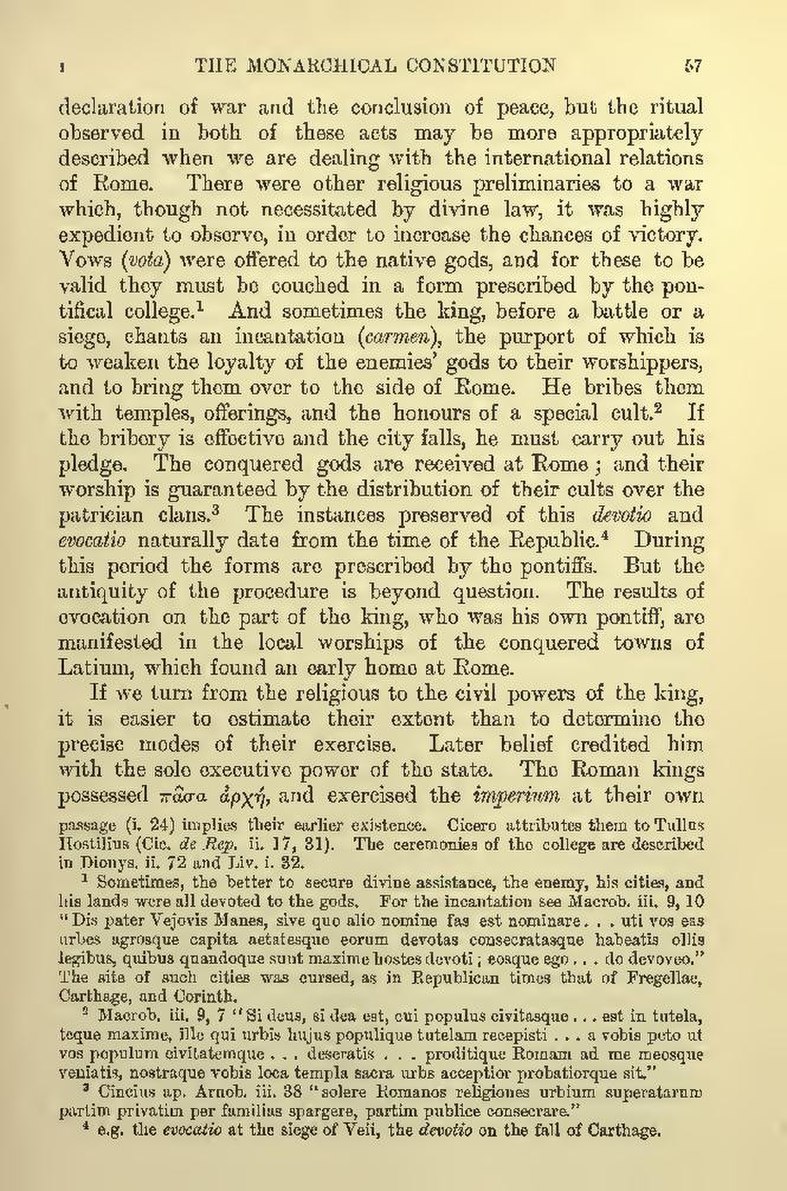declaration of war and the conclusion of peace, but the ritual observed in both of these acts may be more appropriately described when we are dealing with the international relations of Rome. There were other religious preliminaries to a war which, though not necessitated by divine law, it was highly expedient to observe, in order to increase the chances of victory. Vows (vota) were offered to the native gods, and for these to be valid they must be couched in a form prescribed by the pontifical college.[1] And sometimes the king, before a battle or a siege, chants an incantation (carmen), the purport of which is to weaken the loyalty of the enemies' gods to their worshippers, and to bring them over to the side of Rome. He bribes them with temples, offerings, and the honours of a special cult.[2] If the bribery is effective and the city falls, he must carry out his pledge. The conquered gods are received at Rome; and their worship is guaranteed by the distribution of their cults over the patrician clans.[3] The instances preserved of this devotio and evocatio naturally date from the time of the Republic.[4] During this period the forms are prescribed by the pontiffs. But the antiquity of the procedure is beyond question. The results of evocation on the part of the king, who was his own pontiff, are manifested in the local worships of the conquered towns of Latium, which found an early home at Rome.
If we turn from the religious to the civil powers of the king, it is easier to estimate their extent than to determine the precise modes of their exercise. Later belief credited him with the sole executive power of the state. The Roman kings possessed [Greek: pasa archê], and exercised the imperium at their own
- [Footnote: passage (i. 24) implies their earlier existence. Cicero attributes them to Tullus
Hostilius (Cic. de Rep. ii. 17, 31). The ceremonies of the college are described in Dionys. ii. 72 and Liv. i. 32.]
- ↑ Sometimes, the better to secure divine assistance, the enemy, his cities, and his lands were all devoted to the gods. For the incantation see Macrob. iii. 9, 10 "Dis pater Vejovis Manes, sive quo alio nomine fas est nominare . . . uti vos eas urbes agrosque capita aetatesque eorum devotas consecratasque habeatis ollis legibus, quibus quandoque sunt maxime hostes devoti; eosque ego . . . do devoveo." The site of such cities was cursed, as in Republican times that of Fregellae, Carthage, and Corinth.
- ↑ Macrob. iii. 9, 7 "Si deus, si dea est, cui populus civitasque . . . est in tutela, teque maxime, ille qui urbis hujus populique tutelam recepisti . . . a vobis peto ut vos populum civitatemque . . . deseratis . . . proditique Romam ad me meosque veniatis, nostraque vobis loca templa sacra urbs acceptior probatiorque sit."
- ↑ Cincius ap. Arnob. iii. 38 "solere Romanos religiones urbium superatarum partim privatim per familias spargere, partim publice consecrare."
- ↑ e.g. the evocatio at the siege of Veii, the devotio on the fall of Carthage.
